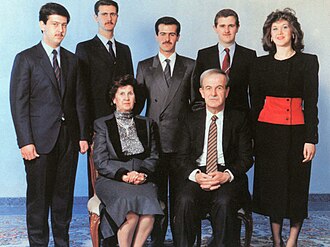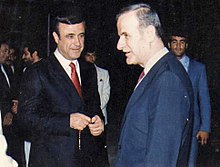al-Assad (family)
The al-Assad or Asad family ( Arabic الأسد, DMG al-asad 'the lion') has ruled Syria since Hafiz al-Assad became Syrian President in 1971 and established an authoritarian state under the control of the Ba'ath Party . After his death in 2000, he was followed by his son Bashar .
The al-Assads come from Qardaha in northwest Syria and belong to the Alawite Kalabiyya tribe. The name "Assad" goes back to Ali Sulayman (1875-1963) who changed his surname in 1927, which is probably related to his social prestige as a local "judge" and his political activities. All current members of the al-Assad family go back to him and his second wife Naissa, who came from a village in the Alawite Mountains .
Political scientists have characterized the family's form of government over Syria as a dictatorship .
Hafiz's family
- Hafiz al-Assad (1930-2000)
-
Anisa Machluf (1930–2016), Hafiz's wife
- Bushra al-Assad, died before 1960 in infancy
- Bushra al-Assad (* 1960), widow of Asif Shaukat († July 2012), the former head of the military intelligence service
- Basil al-Assad (1962–1994), originally intended to succeed his father, died in a traffic accident in 1994
- Bashar al-Assad (* 1965), originally an ophthalmologist , but since 2000 acting president because of Basil's death; married to Asma al-Achras , they have three children together
- Majed al-Assad (~ 1966–2009), electrical engineer, died in 2009 after a long illness
- Mahir al-Assad (* 1967), commander of the Republican Guard in Damascus ; he is said to have an aggressive and uncontrolled character
Buschra and the mother Anisa are considered to be dominant figures within the family and ensure solidarity. When Buschra fell in love with the divorced officer Asif Schaukat in the late 1980s, this caused violent conflicts. Hafiz and Basil in particular refused the connection. After Basil's traffic death and the incipient illness of Hafiz, Buschra finally got her married in 1995. As a result, however, an intense rivalry arose between Shaukat and Mahir, who saw his position threatened. In 1999, Mahir shot Schaukat in the stomach during an argument, after which Schaukat had to be treated in France . Through Buschra's intervention, the two found a more peaceful relationship with each other in the years that followed.
Bashar, who had lived in London , returned to Syria in 1994 to prepare for heir to the throne instead of Basils. During the last years of his life, Hafiz disempowered some people who might have denied their loyalty to Bashar. Bushra used this time skillfully to bring her husband Asif into positions of power. After Hafiz's death in 2000, Baschar became president as planned and, surprisingly even for confidants, married his college friend Asma al-Achras, who had grown up in London. Anisa did not agree with this connection, possibly because Asma is Sunni . Buschra, on the other hand, is particularly bothered by Asma's great media presence and has repeatedly made attempts to prevent this.
Mahir and Bashar have a good relationship. Mahir sees himself as Bashar's right-hand man, similar to the role Hafiz's brother Rifaat al-Assad had before their rift in the early 1980s. The two maintain a tense relationship with Anisa's nephews Rami and Ihab Machluf, which is characterized by both business cooperation and rivalry. Anisa intervened several times to prevent her sons from snatching business areas from the Machluf brothers. The situation becomes explosive because of the close relationship between Bushra and Rami.
Extended family circle

Hafiz's siblings
-
Jamil al-Assad (1933–2004), politically marginalized years before his death
- Mundhir al-Assad, was arrested at Beirut airport in 2005 while entering Lebanon
- One daughter is married to Yarob Kanaan, whose father Ghazi Kanaan (1942–2005) presumably committed suicide in 2005 while serving as interior minister; The Canaans come from the Kalabiyya tribe
-
Rifaat al-Assad (* 1937), living in exile since an attempted coup in 1983, in London since 2010; married to four women :
- Amira al-Assad, a cousin
- Sana 'Machluf, from the family of Hafiz' wife
- Raja Barakat, from a wealthy Sunni Damascus family
- Lina al-Khayer, sister-in-law of the late Saudi King Abdullah ibn Abd al-Aziz
- Rifaat has a number of children from these marriages, including:
- Ribal al-Assad , living abroad since he was nine, currently USA ; In an interview in 2010, he denied his father's involvement in the Hama massacre or his family branch's links to Abd al-Halim Chaddam or Ghazi Kanaan.
- Somar al-Assad, actively supports his father in his opposition to Bashar
- Lamia, married to 'Ala al-Fayad, the son of Shafiq al-Fayad (former Syrian general )
- Mudar al-Assad, married to May Haydar, daughter of the Syrian multimillionaire Muhammad Haydar
- Tumadhir, married to Mu'ein Nasef Kheir Bek (also from the Kalabiyya tribe), who is distantly connected to Abd al-Halim Khaddam, Rafiq Hariri and the influential Damascus al-Atassi family through kinship and marriage
- Almost nothing is known about Hafiz's siblings Bayat (who died at the age of 18), Bahija and an unknown sister.
Hafiz's cousins
- Adnan al-Assad , head of a militia in Damascus
- Muhammad al-Assad , another leader of the same militia
- Numeir al-Assad, second cousin of Hafiz's children, led a criminal gang in Latakia and was arrested after robbing a bank
Anisa's relatives (Machluf family)
The Machlufs belong to the Alawi Haddadin tribe, both Hafiz and Rifaat have a connection through marriage. The family's net worth was estimated at approximately $ 3 billion in 2006 .
- Adnan Machluf, Anisa's cousin
- Rami Machluf , main owner of SyriaTel , was the richest person in Syria as of 2019
- Hafez Makhlouf, head of the Syrian secret service until 2014, since then asylum in Belarus
- Ihab Machluf, u. a. responsible for the US properties of the Machlufs
- Mohannad Machluf, living in the USA
Schalisch family
- Dhu al-Himma (Zuheir) Schalisch, General , private assets in the target area of the US authorities
- Asef Isa Schalisch, cousin of Hafiz's children; Manager of SES, a company engaged in the arms trade with Iraq and Iran is embroiled
Web links
- Wolfgang Günter Lerch : Family Assad: The Syrian Triumvirate. In: Frankfurter Allgemeine Zeitung . June 19, 2011, accessed June 20, 2011 (detailed analysis by the Assad family).
Individual evidence
- ^ A b Martin Stäheli: The Syrian Foreign Policy under Hafiz Assad , Franz Steiner Verlag, Stuttgart 2001, ISBN 3-515-07867-3 ; P. 40
- ↑ Raymond Hinnebusch: Syria: from 'authoritarian upgrading' to revolution? In: International Affairs . tape 88 , no. 1 , January 1, 2012, ISSN 0020-5850 , p. 95–113 , doi : 10.1111 / j.1468-2346.2012.01059.x ( oup.com [accessed April 21, 2020]).
- ^ Authoritarian Apprehensions . ( uchicago.edu [accessed April 21, 2020]).
- ↑ Weeks, Jessica: Dictators at War and Peace. C. p. 18. Ed .: Cornell University Press. S. 18 .
- ^ Susanne Michalik: Measuring Authoritarian Regimes with Multiparty Elections . In: Multiparty Elections in Authoritarian Regimes: Explaining their Introduction and Effects (= Studies on the New Political Economy ). Springer Fachmedien, Wiesbaden 2015, ISBN 978-3-658-09511-6 , pp. 33-45 , doi : 10.1007 / 978-3-658-09511-6_3 .
- ↑ a b c d Mohamad Daoud: Dossier: Bushra Assad. (No longer available online.) In: Mideast Monitor. October 2006, archived from the original on July 21, 2011 ; Retrieved April 2, 2011 .
- ↑ William E. Schmidt: ASSAD'S SON KILLED IN CAR CRASH ON. In: The New York Times . January 22, 1994, accessed March 31, 2011 .
- ↑ SANA: Bashar al-Assad's Youngest Brother Dead. In: iloubnan.info. December 12, 2010, accessed April 3, 2011 .
- ↑ “Majd Hafiz al-Assad, the younger brother of President Bashar al-Assad, died on Saturday December 12, 2009 at the age of 43”, in Joshua Landis' blog , December 13, 2009.
- ↑ a b c d e f Shmuel Bar: Bashar's Syria: The Regime and its Strategic Worldview. In: Comparative Strategy. 25, 2006, Special Issue, p. 379.
- ↑ a b c d Shmuel Bar: Bashar's Syria: The Regime and its Strategic Worldview. In: Comparative Strategy. 25, 2006, Special Issue, p. 380
- ↑ a b c d e f g h i Shmuel Bar: Bashar's Syria: The Regime and its Strategic Worldview. In: Comparative Strategy. 25, 2006, Special Issue, p. 381
- ^ A b Robert Fisk: Freedom, democracy and human rights in Syria - Ribal al-Assad gives our writer a rare insight into the dynasty that has shaped modern Syria. In: The Independent. September 16, 2010, accessed April 3, 2011 .
- ↑ Shmuel Bar: Bashar's Syria: The Regime and its Strategic Worldview. In: Comparative Strategy. 25, 2006, Special Issue, p. 382
- ↑ Raniah Salloum, DER SPIEGEL: Syria: Bashar al-Assad versus Rami Makhlouf - DER SPIEGEL - Politics. Retrieved May 5, 2020 .
- ↑ Raniah Salloum, DER SPIEGEL: Syria: Bashar al-Assad versus Rami Makhlouf - DER SPIEGEL - Politics. Retrieved May 5, 2020 .
- ^ A b Shmuel Bar: Bashar's Syria: The Regime and its Strategic Worldview. In: Comparative Strategy. 25, 2006, Special Issue, p. 395
- ^ Alphabetical Listing of Specially Designated Nationals and Blocked Persons (“SDN List”). In: US Department of the Treasury. March 31, 2011, accessed April 3, 2011 .


